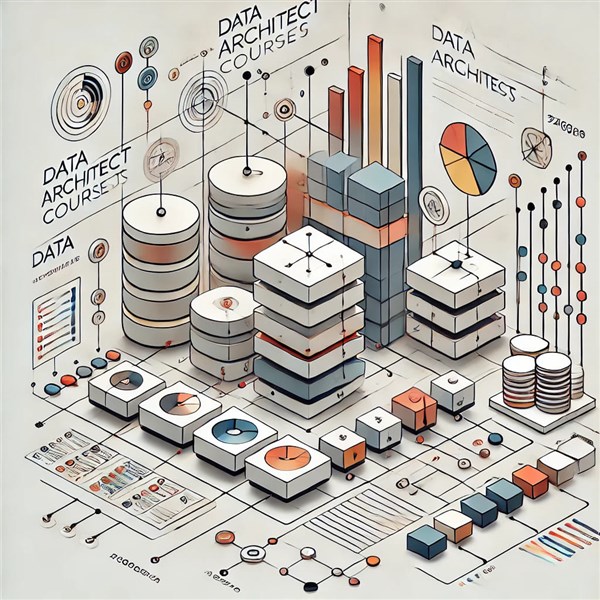
In today’s data-driven landscape, the role of a data architect is becoming increasingly critical. A data architect is responsible for designing, creating, and maintaining the data infrastructure that organizations rely on to make informed decisions. To excel in this role, professionals must be equipped with a comprehensive set of skills, particularly in programming languages and tools. This blog delves into the top programming languages and tools covered in data architect courses that are essential for success in this field.
Understanding the Role of a Data Architect
Before we dive into the specifics of programming languages and tools, it’s important to understand what a data architect does. Data architects design data systems and structures that allow organizations to collect, store, and analyze data effectively. They work closely with data scientists, analysts, and IT teams to ensure that the data infrastructure aligns with business goals. Their responsibilities often include:
- Data Modeling: Designing data models that define the structure and organization of data.
- Database Design: Creating and optimizing databases to support data storage and retrieval.
- Data Integration: Ensuring that different data sources can communicate and work together seamlessly.
- Data Governance: Establishing policies for data management, security, and compliance.
With these responsibilities in mind, let’s explore the programming languages and tools that are essential for data architects.
1. SQL (Structured Query Language)
SQL is the foundational programming language for managing and manipulating relational databases. As a data architect, you will frequently work with SQL to:
- Design Database Schemas: Define the structure of databases, including tables, relationships, and constraints.
- Write Queries: Retrieve and manipulate data from databases, allowing for effective data analysis and reporting.
- Optimize Performance: Write efficient queries to ensure that databases perform well, especially with large datasets.
Courses in data architecture often include extensive training in SQL, as it is crucial for anyone working with data.
2. Python
Python is a versatile programming language widely used in data analysis, machine learning, and data manipulation. As a data architect, Python can be valuable for:
- Data Processing: Using libraries like Pandas and NumPy to clean and transform data.
- Automation: Writing scripts to automate data ingestion, transformation, and reporting processes.
- Integration: Connecting to various data sources, including APIs and web services, to pull in data for analysis.
Many data architect courses will cover Python, particularly in relation to data processing and automation tasks.
3. R
R is another popular programming language, especially in statistical computing and data analysis. While it is not as widely used for database management as SQL, R is essential for data architects who focus on data analytics. Its benefits include:
- Statistical Analysis: Conducting complex statistical analyses to derive insights from data.
- Data Visualization: Using packages like ggplot2 to create visual representations of data, which can be valuable for communicating findings to stakeholders.
Data architect courses that emphasize analytics often include training in R to help professionals understand data from a statistical perspective.
4. Java
Java is a robust programming language often used in large-scale applications and big data environments. For data architects, Java can be particularly useful for:
- Big Data Technologies: Many big data frameworks, such as Apache Hadoop and Apache Spark, are written in Java, making it essential for working with large datasets.
- Data Pipeline Development: Building data ingestion and processing pipelines that require performance and scalability.
Courses focusing on big data solutions will typically cover Java as part of the curriculum.
5. Apache Hadoop
Hadoop is an open-source framework for distributed storage and processing of large datasets. Understanding Hadoop is critical for data architects involved in big data projects. Key components include:
- HDFS (Hadoop Distributed File System): Used for storing data across multiple machines, ensuring redundancy and reliability.
- MapReduce: A programming model for processing large datasets in parallel, allowing for efficient data processing.
Data architect courses often include hands-on training with Hadoop to prepare professionals for real-world big data challenges.
6. Apache Spark
Spark is another powerful big data processing engine that works well with Hadoop. It provides an interface for programming entire clusters with implicit data parallelism and fault tolerance. Key features include:
- Speed: Spark processes data in memory, making it significantly faster than Hadoop’s MapReduce.
- Real-time Processing: Supports streaming data, enabling real-time analytics.
Courses covering big data architecture will usually include training on Apache Spark, given its importance in the industry.
7. NoSQL Databases
As organizations increasingly adopt flexible data models, knowledge of NoSQL databases becomes essential for data architects. Some popular NoSQL databases include:
- MongoDB: A document-oriented database that allows for flexible schema design.
- Cassandra: A wide-column store that excels in handling large amounts of data across many servers.
Data architect courses often include modules on NoSQL databases to provide a well-rounded understanding of different data storage solutions.
8. Data Warehousing Tools
Data warehousing tools are critical for consolidating data from various sources for analysis and reporting. Some key tools include:
- Amazon Redshift: A cloud-based data warehousing solution that allows for fast querying and analysis of large datasets.
- Google BigQuery: A fully-managed data warehouse that enables super-fast SQL queries using the processing power of Google’s infrastructure.
Courses in data architecture frequently cover these tools, as they are essential for building effective data ecosystems.
9. ETL Tools
Extract, Transform, Load (ETL) tools are vital for data integration processes. Understanding these tools is crucial for data architects involved in data migration and warehousing. Key ETL tools include:
- Talend: An open-source ETL tool that provides a graphical interface for data integration tasks.
- Informatica: A widely used ETL platform known for its robust data integration capabilities.
Data architect courses will typically include training on ETL tools to help professionals effectively manage data workflows.
10. Cloud Platforms
As businesses increasingly move to the cloud, knowledge of cloud platforms is essential for data architects. Key platforms include:
- Amazon Web Services (AWS): Offers a wide range of cloud services, including data storage, analytics, and machine learning.
- Microsoft Azure: Provides various services for data management, including Azure SQL Database and Azure Data Lake.
Data architect courses often cover cloud architecture and services, helping professionals design scalable and flexible data solutions.
Conclusion
The role of a data architect is multifaceted and requires a diverse set of skills in programming languages and tools. Data architect courses provide professionals with the knowledge and hands-on experience necessary to succeed in this dynamic field. From mastering SQL and Python to understanding big data frameworks like Hadoop and Spark, these courses equip aspiring data architects with the essential skills to design and manage data infrastructures effectively. As organizations continue to rely on data to drive decision-making, the demand for skilled data architects will only grow, making now the perfect time to invest in your education.
At Koenig Solutions, a leading IT training company, we offer comprehensive data architecture and data architect certification courses. Our programs are designed to equip you with the skills and knowledge necessary to thrive as a data architect in today's data-driven world. Get in touch with us today to find out more about our courses and how they can help you advance your career.







COMMENT